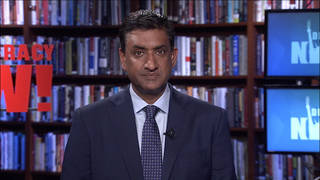
Guests
- Elora Mukherjeeprofessor of law and director of the Immigrants’ Rights Clinic at Columbia Law School.
As Congress approved some $45 billion to expand ICE’s immigration detention capacity, including the jailing of families and children, we look at the case of one family. In May, plainclothes ICE agents detained a 6-year-old boy from Honduras who has acute lymphoblastic leukemia, along with his 9-year old sister and their mother, as they left their immigration court hearing in Los Angeles. In detention, the boy missed a key doctor’s appointment, and the family said his sister cried every night. As pressure grew over their conditions, the family was released on July 2. “The little boy doesn’t want to leave his home. He’s terrified. He sobs, cries and screams when his mother takes him out of the house,” says attorney Elora Mukherjee, who represents the boy and his family and is director of the Immigrants’ Rights Clinic at Columbia Law School. She says the young children are traumatized after their month in ICE detention.
Transcript
AMY GOODMAN: This is Democracy Now!, democracynow.org. I’m Amy Goodman.
We begin today’s show looking at how the Trump administration is pushing ahead on its aggressive quota of as many as 7,000 daily immigration arrests, up from 3,000. Homeland Security Secretary Kristi Noem spoke Friday at a news conference in Nashville, Tennessee.
DHS SECRETARY KRISTI NOEM: President Trump has been focused, ever since he’s been in office, on making America safe again. And that is what my job is as a secretary, is to make sure that we’re following through on exactly what he promised the American people, to make sure that we’re going after the worst of the worst every single day, get the murderers, the rapists, the child pedophiles and pornographers off of our streets and out of this country.
AMY GOODMAN: “The worst of the worst.” But according to figures from ICE itself that were obtained by the Cato Institute, over 93% of immigrants arrested this fiscal year were never convicted of any violent offense. Still, Congress approved some $45 billion to expand ICE’s immigration detention capacity, including the jailing of families and children.
We begin today’s show with a story of one Los Angeles family arrested after they dutifully showed up at their immigration hearing. They were then taken to a family detention center in Dilley, Texas, that Trump reopened.
On May 29th, plainclothes ICE agents detained a 6-year-old boy from Honduras who had acute lymphoblastic leukemia, along with a 9-year-old sister and their mother, as they left their immigration court hearing in which their asylum case was dismissed, even though they had followed every rule of the immigration process. In detention, the boy missed a key doctor’s appointment, disrupting his cancer treatment. The family also said his sister cried every night, afraid as pressure grew over their conditions. The family was released on July 2nd. An ICE spokesperson claimed, quote, “Any implications that ICE would deny a child proper medical care are false,” unquote.
For more, we’re joined by Elora Mukherjee, an attorney who represents the boy and his family. She’s a professor of law and director of the Immigrants’ Rights Clinic at Columbia Law School.
Thanks so much for joining us from Columbia. Elora, tell us the story of this young family and the 6-year-old boy with leukemia.
ELORA MUKHERJEE: Thank you for having me, Amy.
So, this is a family that did everything right. While they were in Honduras, they faced imminent, menacing death threats. The family then fled to the United States, but they didn’t cross the border unlawfully, illegally. Instead, they waited in Mexico until they had an appointment through the CBP One app to enter the United States. They showed up at exactly the date and time that they were assigned by the U.S. government. And at that point, the Department of Homeland Security paroled the family into the United States, necessarily finding that the family posed no danger to the community and no flight risk. The family then integrated into their community in Los Angeles. The kids were enrolled in school. The family attended church every Sunday. The little boy loved playing soccer in the park with his friends. And they did everything right. They had never been accused or charged with any crime anywhere in the world, not in the United States.
And then, as you said, they dutifully showed up to their immigration court hearing on May 29th, 2025. That was a routine immigration court hearing. All three of them went. And at the hearing, the mom explained to the immigration judge that she wished to continue with their asylum cases, but DHS moved to dismiss those cases. The immigration judge quickly granted the department’s motion to dismiss the cases, without giving the family the time that they are entitled to under the relevant rules to explain their opposition to the motion to dismiss. And as soon as the immigration judge granted the motion to dismiss, the family stepped out of the courtroom, and there they were met by men dressed in civilian clothing, ICE officers, who arrested them and detained them, told them they couldn’t go home, told them they couldn’t make a phone call.
The family was first detained in the courtroom — in the courthouse itself, and then they were taken to a immigration processing center in Los Angeles. There, the family was held overnight, not given adequate food. And while the family was there, an ICE officer lifted his shirt, which displayed a gun. This terrified the little boy. He urinated on himself. He was left in wet clothing for hours overnight, until the family was put on a flight to Texas the next day. Then they were detained for over a month.
And throughout that month, I repeatedly begged the Department of Homeland Security to release this family. The department didn’t do so. That is why, with co-counsel, I filed a federal habeas petition on behalf of the family. And we are all extremely grateful that the family was released earlier this month.
AMY GOODMAN: So they were held for just over a month. You have an ICE spokesperson claiming any implications ICE would deny a child proper medical care are false. Elora, can you explain — can you respond to what that person said?
ELORA MUKHERJEE: The mom of this young boy was terrified throughout their time in detention that he wasn’t receiving appropriate medical care. He showed signs of easy bruising. He lost his appetite. He had occasional bone pain. He and his sister cried every night and prayed to God that God would let them out of this detention center.
And this connects to a broader theme. Right now there are hundreds of families who are detained at the Dilley immigrant processing center in Texas. And for asylum-seeking families and children, detention is just not appropriate. All the major medical associations — the American Academy of Pediatrics, the American Medical Association, the American Psychiatric Association — and other medical organizations have condemned the use of family detention for immigrant children who are seeking asylum, because even brief periods of detention can have long-lasting mental health effects on the children who are affected.
Taking this particular family, it’s worth noting that although they’ve been released from detention, the children are still facing the consequences of their month of detention. The little boy doesn’t want to leave his home. He’s terrified. He sobs. cries and screams when his mother takes him out of the house. The 9-year-old girl lost her appetite while she was in detention, and she’s still not eating properly. And their mom is trying to get both kids the medical care that they now need as a result of their time in detention.
AMY GOODMAN: You worked on the Flores settlement. Trump is trying to get rid of it. What is the significance of this, that children aren’t supposed to be held for more than a number of days?
ELORA MUKHERJEE: Yes, that’s exactly right, Amy. The Flores settlement agreement was reached in 1997. It has two basic components. First, it guarantees children in federal immigration custody basic minimal protections: access to adequate water, access to adequate food, access to basic sanitary conditions during their detention. And, two, it prioritizes the release of children as promptly as possible from detention, in recognition that detention is not appropriate for children who are seeking asylum, survivors of trauma.
And the Trump administration has moved to terminate the Flores settlement agreement, leaving children with no protections in federal immigration custody at a time when $45 billion have been allocated for immigration detention, including for the detention of immigrant families.
AMY GOODMAN: What happens to the family now, as we wrap up?
ELORA MUKHERJEE: For this particular family, they will continue to fight for their right to stay in the United States. They’re pursuing humanitarian relief, specifically asylum. They have a strong asylum claim. And if they are given a fair opportunity to present their case, I hope that they are able to stay in the United States and continue to make contributions to this country.
AMY GOODMAN: Elora Mukherjee, I want to thank you for being with us, professor of law at Columbia Law School, director of the Immigrants’ Rights Clinic there.













Media Options